
East West Players continues its two-year-long 50th-anniversary celebration with Chinglish, David Henry Hwang’s hilarious, perceptive, eye-opening look at Chinese-American relationships (including one of a particularly romantic/sexual nature), a Los Angeles Premiere that could well prove one of EWP’s most popular productions ever. It’s certainly one of the finest I’ve seen onstage at the David Henry Hwang Theater.
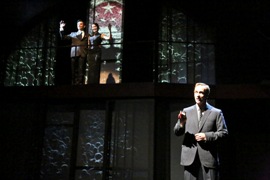 Business, political, and romantic complications all ensue when West meets East in the Chicago-to-Broadway hit whose title can best be explained with the following examples of English-to-Chinese (and-then-back-again-to-English) translations:
Business, political, and romantic complications all ensue when West meets East in the Chicago-to-Broadway hit whose title can best be explained with the following examples of English-to-Chinese (and-then-back-again-to-English) translations:
• “To take notice of safe. The slippery are very crafty.” (=Slippery Slopes Ahead)
• “Financial Affairs Is Everywhere Long.” (=Chief Financial Officer)
• “Fuck the Certain Price of Goods.” (=Dry Goods Pricing Department)
These are just a few of the “Chinglish” phrases Daniel Cavanaugh shows us in the play’s prologue, one which has the Clevelander warning assembled members of the Commerce League Of Ohio, “When doing business in China, always bring your own translator,” the first of many lessons learned by our redheaded, red-blooded American hero on his initial visit to China in hopes of securing a government contract for his family-run company, Ohio Signage, to provide bilingual signs for a world-class Arts Center in the southwest Chinese city of Guiyang.
Longtime English expatriate Peter Timms cautions Daniel that in China, “business is built on relationships,” aka guanxi, and that the American’s planned one-week trip to China had better be extended to at least eight. And as for tooting Daniel’s own horn American-style, Peter’s advice is: “Criticize yourself, but make sure there’s someone else in the room who will contradict you—ideally, at great length.”
The truth of all of the above becomes abundantly clear in Daniel’s first meeting with Minister Cai Guoliang and Vice Minister Xi Yan, one in which interpreter Miss Qian takes Daniel’s “We’re a small family firm” and renders it “His company is tiny and insignificant,” or when Daniel assures the ministers that Ohio Signage is worth the cost, words Miss Qian translates as, “He will explain why he spends money so recklessly.”
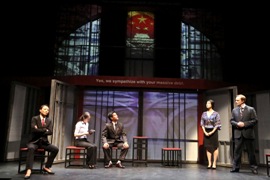 As for how we in the audience can understand what these Chinese speakers are saying given Daniel’s assessment that “if you are an American, it is … safe to assume that you do not speak a single fucking foreign language,” Chinglish’s many long chunks of Chinese dialog are translated into easy-to-see English language supertitles.
As for how we in the audience can understand what these Chinese speakers are saying given Daniel’s assessment that “if you are an American, it is … safe to assume that you do not speak a single fucking foreign language,” Chinglish’s many long chunks of Chinese dialog are translated into easy-to-see English language supertitles.
With the incompetent Miss Qian sent away to a re-education camp, Madame Xi sets up a private meeting with Daniel during which she struggles to understand his English without aid of a translator, a feat which proves every bit as difficult as the American’s attempts to piece together the young Chinese woman’s broken English.
By the end of this meeting, two things have become clear to Daniel: first, that if things go the way they appear to be doing, there will be no deal with the Chinese, and second, that the beautiful if rather severe Xi Yan is a woman he would like to know better.
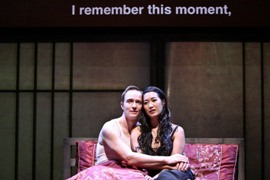 As it turns out, Daniel and Yan do get to know each other, not only better but in the Biblical sense, as Daniel finds his faith in fairy tale/romcom happy endings put to the test by a woman who looks at love and marriage as two entirely different matters. (A scene between Daniel and Xi in which the American makes one bumbling attempt to say “I love you” in Chinese after another—“My fifth aunt” “Dirty sea mud” “Frog loves to pee”—is not only one of the play’s funniest, it proves that language mangling goes both ways.)
As it turns out, Daniel and Yan do get to know each other, not only better but in the Biblical sense, as Daniel finds his faith in fairy tale/romcom happy endings put to the test by a woman who looks at love and marriage as two entirely different matters. (A scene between Daniel and Xi in which the American makes one bumbling attempt to say “I love you” in Chinese after another—“My fifth aunt” “Dirty sea mud” “Frog loves to pee”—is not only one of the play’s funniest, it proves that language mangling goes both ways.)
Among the lessons Daniel (and we) learn along the way is that even bringing along your own first-rate interpreter will not help all that much in understanding the cultural differences that separate the U.S. and China. Take, for instance, several Chinese characters’ reaction to the Enron scandal (I won’t give away why this topic arises) in a scene that is one of the play’s funniest—and most edifying.
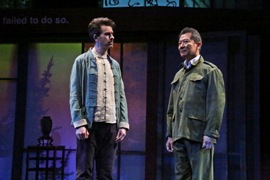 Another lesson we learn, or perhaps are simply reminded of, is that surface impressions can lie, because if you think your first and even second impressions of Hwang’s characters are spot-on, be prepared to think again, since virtually nobody in Chinglish is who we initially believe them to be, nor for that matter who they say they are.
Another lesson we learn, or perhaps are simply reminded of, is that surface impressions can lie, because if you think your first and even second impressions of Hwang’s characters are spot-on, be prepared to think again, since virtually nobody in Chinglish is who we initially believe them to be, nor for that matter who they say they are.
I’m told that this is the first Chinglish staging in which both director and cast (with one appropriate exception) are all fluent Mandarin speakers, and having East West Players favorite Jeff Liu at the helm gives this production a distinctly Chinese-POV authenticity.
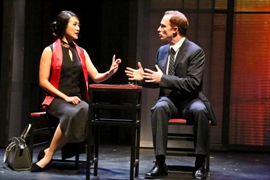 In a role that has him centerstage virtually throughout Chinglish’s two-hour running time, the marvelous Matthew Jaeger makes for a Midwesternly pitch-perfect Daniel, Chinglish’s stand-in for every fish-out-of-water American who’s ever found himself in a foreign land with no idea what’s what.
In a role that has him centerstage virtually throughout Chinglish’s two-hour running time, the marvelous Matthew Jaeger makes for a Midwesternly pitch-perfect Daniel, Chinglish’s stand-in for every fish-out-of-water American who’s ever found himself in a foreign land with no idea what’s what.
As for Xi Yan, though Kara Wang could work harder at making us believe the Chinese woman is really struggling to find the right words and not simply speaking broken English, the gorgeous UCI grad invests the role with sexiness and smarts in equal measure.
EWP lucked out big time in Yale grad Jeff Locker, whose mastery of Mandarin (and sexy good looks) have not only turned the Ohio-born-and-bred actor/writer into a Taiwanese film/TV celebrity, they make him a couldn’t-be-better choice for Peter, a role he played last year in Portland and Syracuse. (That Locker’s acting chops—and English accent—match his Chinese language gifts is icing on the cake.)
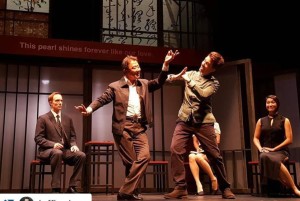 Ben Wang’s delicious take on Cai Guoliang makes one wonder whether the Mao-suited Chinese official might not be more himself (and I quote Jerry Herman here) if he were wearing “sparkle dust, bugle beads, [and] ostrich plums.”
Ben Wang’s delicious take on Cai Guoliang makes one wonder whether the Mao-suited Chinese official might not be more himself (and I quote Jerry Herman here) if he were wearing “sparkle dust, bugle beads, [and] ostrich plums.”
Both Ewan Chung and Leann Lei play two diametrically different roles to terrific effect. Chung delights both as the family connections-blessed Bing (whose American-wannabe clothes are sadly not matched by his English language skills) and as an all-business Judge (who like just about everyone else may surprise you with his own family ties). Lei is equally delightful as the gauchest (and most gung-ho) interpreter imaginable and as butch-chic Prosecuter Li.
Joy Yao gets just one scene as mousy Miss Zhao (whose translation skills rival Bing’s and Miss Quan’s in ineptitude) but it’s a bona-fide laugh-winner.
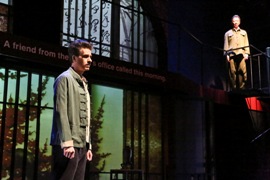 Hana Sooyeon Kim’s smartly designed set and projections take us from hotel lobby to restaurant to government office to hotel room and back again with a distinctly Asian look and flair.
Hana Sooyeon Kim’s smartly designed set and projections take us from hotel lobby to restaurant to government office to hotel room and back again with a distinctly Asian look and flair.
Yuheng Dai’s costumes are another design winner, from drab Chinese government official garb to Yan’s slinky evening wear to Bing’s hip-hop threads. Lonnie Rafael Alcaraz’s lighting, Dennis Yen’s sound, and Michael O’Hara’s properties are all Grade-A as well.
Sylvia Trinh is stage manager. Hao Zheng is assistant director and Brandon Cheng is assistant stage manager.
Playwright Hwang won the 1988 Tony Award for M. Butterfly, his fact-based examination of the relationship between a French diplomat and a Peking Opera singer who convinced him for twenty years that he was a she.
If Chinglish ends up a whole lot funnier (and ultimately more optimistic) than Hwang’s earlier play, it is every bit as fascinating an exploration of East vs. West and just how difficult it is for the twain to ever really meet.
That it is being staged in the theater that bears his name is ice-formation level jelly roll. (That’s Chinglish for icing on the cake.)
East West Players, David Henry Hwang Theatre, 120 Judge John Aiso St., Los Angeles.
www.eastwestplayers.org
–Steven Stanley
September 16, 2015
Photos: Michael Lamont
Tags: David Henry Hwang, East West Players, Los Angeles Theater Review



 Since 2007, Steven Stanley's StageSceneLA.com has spotlighted the best in Southern California theater via reviews, interviews, and its annual StageSceneLA Scenies.
Since 2007, Steven Stanley's StageSceneLA.com has spotlighted the best in Southern California theater via reviews, interviews, and its annual StageSceneLA Scenies.







 COPYRIGHT 2025 STEVEN STANLEY :: DESIGN BY
COPYRIGHT 2025 STEVEN STANLEY :: DESIGN BY